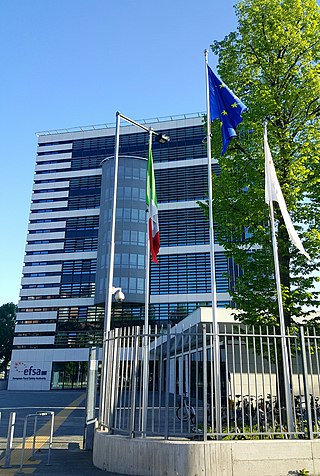
The Community acquis or acquis communautaire, sometimes called the EU acquis and often shortened to acquis, is the accumulated legislation, legal acts and court decisions that constitute the body of European Union law that came into being since 1993. The term is French: acquis meaning "that which has been acquired or obtained", and communautaire meaning "of the community".

The Nuclear Energy Agency (NEA) is an intergovernmental agency that is organized under the Organisation for Economic Co-operation and Development (OECD). Originally formed on 1 February 1958 with the name European Nuclear Energy Agency (ENEA)—the United States participated as an Associate Member—the name was changed on 20 April 1972 to its current name after Japan became a member.

Eurostat is a Directorate-General of the European Commission located in the Kirchberg quarter of Luxembourg City, Luxembourg. Eurostat's main responsibilities are to provide statistical information to the institutions of the European Union (EU) and to promote the harmonisation of statistical methods across its member states and candidates for accession as well as EFTA countries. The organisations in the different countries that cooperate with Eurostat are summarised under the concept of the European Statistical System.

The Directorate-General for Communications Networks, Content and Technology is a Directorate-General of the European Commission and is responsible for EU investment in research, innovation and development of critical digital technologies.

The Government of Singapore consists of several departments, known as ministries and statutory boards in Singapore. Ministries are led by a member of the Cabinet and deal with state matters that require direct political oversight. The member of the Cabinet heading the ministry is known as the minister, who is supported by a junior minister known as minister of state in Singapore. The administrative management of the ministry is led by a senior civil servant known as permanent secretary.

The Joint Research Centre (JRC) is the European Commission's science and knowledge service which employs scientists to carry out research in order to provide independent scientific advice and support to European Union (EU) policy.

The European Food Safety Authority (EFSA) is the agency of the European Union (EU) that provides independent scientific advice and communicates on existing and emerging risks associated with the food chain. EFSA was established in February 2002, is based in Parma, Italy, and for 2021 it has a budget of €118.6 million, and a total staff of 542.
The Institute for Transuranium Elements (ITU) is a nuclear research institute in Karlsruhe, Germany. The ITU is one of the seven institutes of the Joint Research Centre, a Directorate-General of the European Commission. The ITU has about 300 staff. Its specialists have access to an extensive range of advanced facilities, many unavailable elsewhere in Europe.
The Institute for Reference Materials and Measurements (IRMM), located in Geel, Belgium, is one of the seven institutes of the Joint Research Centre (JRC), a Directorate-General of the European Commission (EC).
The Institute for Energy and Transport (IET) is one of the seven scientific Institutes of the Joint Research Centre (JRC), a Directorate General of the European Commission (EC). It is based both in Petten, the Netherlands and Ispra, Italy, and has a multidisciplinary team of around 300 academic, technical, and support staff.
The Institute for Health and Consumer Protection or IHCP, located in Ispra, Italy, is one of the seven institutes of the Joint Research Centre (JRC), a Directorate-General of the European Commission (EC).
The Programmes and stakeholders relations Directorate or PSR, located in Brussels, Belgium and Ispra, Italy, is part of the Joint Research Centre, a Directorate-General of the European Commission (EC).
The 'Directorate for Resource Management (DRM) located in Brussels, Belgium, is part of the Joint Research Centre, a Directorate-General of the European Commission (EC).

The federal administration of Switzerland is the ensemble of agencies that constitute, together with the Swiss Federal Council, the executive branch of the Swiss federal authorities. The administration is charged with executing federal law and preparing draft laws and policy for the Federal Council and the Federal Assembly.
FEDARENE is the premier European network of regional and local organisations which implement, co-ordinate and facilitate energy and environment policies. Regional and local agencies, regional governments and departments working in these fields, are represented in FEDARENE.
The European Science and Technology Observatory (ESTO) was the first project of the Joint Research Centre's Institute for Prospective Technological Studies based in Seville, Spain.

The European Union (EU) Environmental Policy was initiated in 1973 with the "Environmental Action Programme" at which point the Environmental Unit was formed. The policy has thereafter evolved "to cover a vast landscape of different topics enacted over many decades" (Reuters) and in 2015 the Institute for European Environmental Policy estimated that "the body of EU environmental law" amounted to 500+ directives, regulations and decisions.
"Over the past decades the European Union has put in place a broad range of environmental legislation. As a result, air, water and soil pollution has significantly been reduced. Chemicals legislation has been modernised and the use of many toxic or hazardous substances has been restricted. Today, EU citizens enjoy some of the best water quality in the world"






